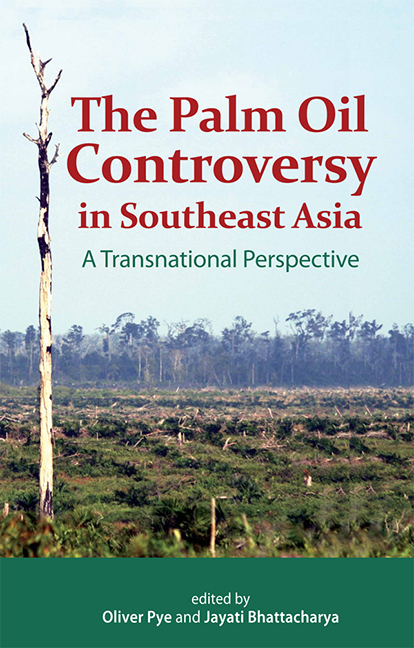Book contents
- Frontmatter
- Contents
- Foreword
- Preface
- Contributors
- Abbreviations
- 1 Introduction
- 2 Malaysian Corporations as Strategic Players in Southeast Asia's Palm Oil Industry
- 3 The Political Ecology of the Indonesian Palm Oil Industry
- 4 Evolutionary Change in the Oil Palm Plantation Sector in Riau province, Sumatra
- 5 Contradictions of Palm Oil Promotion in the Philippines
- 6 The Political Economy of Migration and Flexible Labour Regimes: The Case of the Oil Palm Industry in Malaysia
- 7 Migration and Moral Panic: The Case of Oil Palm in Sabah, East Malaysia
- 8 Reconciling Development, Conservation, and Social Justice in West Kalimantan
- 9 An Analysis of Transnational Environmental Campaigning around Palm Oil
- 10 EU Biofuel Policies and their Implications for Southeast Asia
- 11 Leveraging Product and Capital Flows to Promote Sustainability in the Palm Oil Industry
- 12 Free, Prior, and Informed Consent? Indigenous Peoples and the Palm Oil Boom in Indonesia
- Index
- Plate section
3 - The Political Ecology of the Indonesian Palm Oil Industry
Published online by Cambridge University Press: 21 October 2015
- Frontmatter
- Contents
- Foreword
- Preface
- Contributors
- Abbreviations
- 1 Introduction
- 2 Malaysian Corporations as Strategic Players in Southeast Asia's Palm Oil Industry
- 3 The Political Ecology of the Indonesian Palm Oil Industry
- 4 Evolutionary Change in the Oil Palm Plantation Sector in Riau province, Sumatra
- 5 Contradictions of Palm Oil Promotion in the Philippines
- 6 The Political Economy of Migration and Flexible Labour Regimes: The Case of the Oil Palm Industry in Malaysia
- 7 Migration and Moral Panic: The Case of Oil Palm in Sabah, East Malaysia
- 8 Reconciling Development, Conservation, and Social Justice in West Kalimantan
- 9 An Analysis of Transnational Environmental Campaigning around Palm Oil
- 10 EU Biofuel Policies and their Implications for Southeast Asia
- 11 Leveraging Product and Capital Flows to Promote Sustainability in the Palm Oil Industry
- 12 Free, Prior, and Informed Consent? Indigenous Peoples and the Palm Oil Boom in Indonesia
- Index
- Plate section
Summary
This chapter is based on direct interactions and experiences of social and environmental issues pertaining to oil palm plantations in Indonesia. The information has been compiled from various sources from different regions in seventeen provinces, including case investigations, documentations, testimonies, dialogues, legal and policy interventions, and extensive village meetings that were undertaken by Sawit Watch. Sawit Watch is an Indonesian non-government organization (NGO) concerned with adverse negative social and environmental impacts of oil palm plantation development in Indonesia, which seeks to promote sustainable social justice mandates through human rights based approaches in its activities and interventions. It is active in seventeen provinces and networks in related districts where oil palm plantations are now being developed in Indonesia. Since 1998 our focus has been on vulnerable and affected groups of indigenous peoples, oil palm farmers, and plantation workers.
The expansion of palm oil in Indonesia is driven by the cooperation between large corporations and the Indonesian state, which offers “enabling conditions” in its promotion of palm oil. Currently the Indonesian palm oil Industry produces around 21 million tonnes of crude palm oil (CPO) on over 9 million hectares of plantations (Sawit Watch 2010). The Government of Indonesia has set a production target of 40 million tonnes CPO by 2020 (Krisnamurti 2009). There are already 26.7 million hectares under permits for further oil palm plantation expansion. Moreover, the emerging feedstock demand of agrofuels from the European Union markets and the national biofuel mandatory target are leading to an additional 10–12 million hectares of plantations for biofuel production, of which 65 per cent is slated for export (Krisnamurti 2009).
This chapter argues that the particular political ecology of this palm oil expansion is leading to negative environmental consequences, i.e., forest conversion, peatland conversion, agrochemicals, and pollution connected to the waste from palm oil mills (palm oil mill effluent, or POME). Current research suggests that approximately 18 million hectares of tropical rainforests have been cleared and commercially logged in Indonesia (Colchester et al. 2006).
- Type
- Chapter
- Information
- The Palm Oil Controversy in Southeast AsiaA Transnational Perspective, pp. 48 - 75Publisher: ISEAS–Yusof Ishak InstitutePrint publication year: 2012

